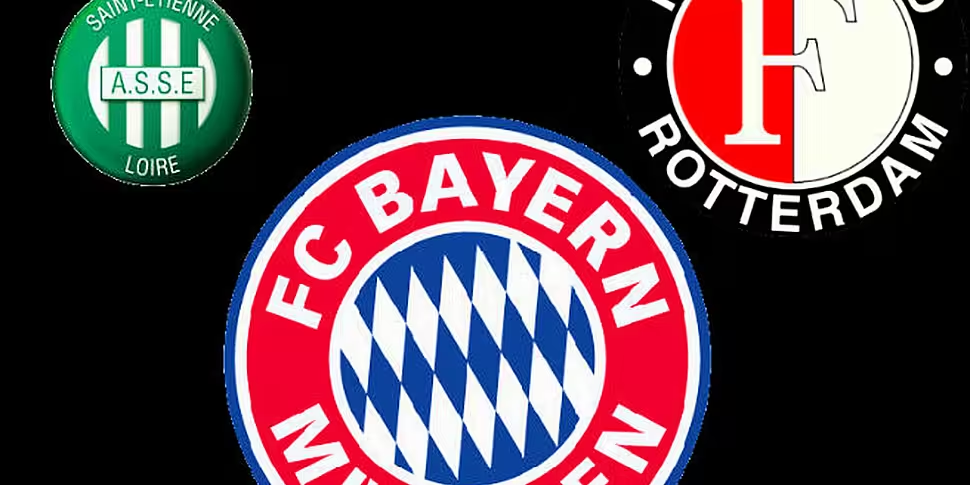Germany
In a European club context, 2013 can definitely be regarded as Germany's year as they produced both Champions League finalists.
The actual strength of the Bundesliga can still be debated at length but there's one thing you cannot argue about: Bayern Munich Sporting Director Matthias Sammer has been one of the main driving forces behind Die Roten's recent rise.
While a new era of domination begins, another era ended as manager Thomas Schaaf ended a 40-year association with his beloved Werder Bremen after leaving by mutual consent, with the club in decline.
And Schalke continued their trend of ups and downs with chronic instability an important part of their history.
Elsewhere in Germany however, I tended to look at the past on Euro Footy Focus.
One of the most interesting pieces to write over the year was why Berlin has never experienced football glory despite being a major European city and the capital of Deutschland. At the time of writing, Hertha Berlin were battling for promotion to the Bundesliga but this season they have found themselves in the shake up for the Champions League places.
Then there was the case of 1967 Bundesliga champions Eintracht Braunschweig who had disappeared into the sands of time only to reemerge in the top flight this season. They might be bottom of the table but it's always good to see clubs with such a storied history getting some attention.
France
Saint Etienne were the first club I wrote about on Euro Footy Focus as they began to rise from mediocrity. French football clubs often experience ebbs and flows, but at the moment Saint Etienne are establishing themselves as an upper mid-table club. It's far removed from their illustrious history but at least it's an improvement on their recent history.
Their rise to the very top is unlikely as PSG and Monaco will lock out the top table due to their deep pockets. But is it good for French soccer in the long run? I had a look at TV money and the tax issue involving Monaco which has been back in the news recently as the French government temporarily backed down in the case of the principality club.
Even before the rise of the new money clubs, Marseille could have been the dominant force in French football due to their early-90s success. But a match-fixing scandal has led to 20 years of regret on the Mediterranean coast.
Lyon were the dominant force in the noughties but have regressed and have turned to their academy as they build a new stadium. Currently 10th in Ligue 1, they have to do things the hard way.
Three places above them during the winter break is Nantes and it is fantastique to see them back where they belong after a torrid few years in Ligue 2.
Netherlands
The intriguing story of Vitesse Arnhem's rise from mediocrity capped off 2013 on Euro Footy Focus. A team owned by a Roman Abramovich associate and staffed with Chelsea loanees could be playing on a TV screen near you in next season's Champions League.
PEC Zwolle caught my attention a couple of months ago. After five games, the Dutch minnows were top of the Eredivisie and caught Feyenoord on the hop on the opening day of this season.
Feyenoord were a heartening case as they have reestablished themselves as Dutch title challengers after a really difficult number of years struggling with debts.
Ajax have won the last few league titles and entering the last month of the summer transfer window hopes were high that they could reach the Champions League knockout stages. That was before the sales of Christian Eriksen and Toby Alderweireld. Consequently a young Ajax side just missed out on the last-16 to AC Milan.
Belgium
Over the border from the Netherlands, the Red Devils have reached next year's World Cup thanks to their Golden Generation. But intriguingly, key Belgium players were actually developed outside the country's borders and that includes Chelsea's Eden Hazard.
Iceland
Iceland came close to qualifying for their first World Cup but their rise should not have come as so much of a surprise given the talents of the generation which reached the 2011 European U21 Championships.
Denmark
At one point in 2013, the Danish league table showed the country's most famous clubs FC Kobenhavn and Brondby occupying the bottom two places. The latter has been struggling financially but since that Euro Footy Focus column, I can happily report that both FC Kobenhavn and Brondby have climbed far from the relegation zone and sit third and fourth respectively.
Austria
Ireland played Austria twice in 2013 - I was shivering in the stands at the home game in March which ended in inevitable heartbreak at a snowy Aviva - and it was a good opportunity to recall the time when the central Europeans were one of the best national teams in the world.
Russia
Russia qualified for the World Cup but a country of its size should be doing far better. But youth development remains a bit of an issue despite the money floating around in the Russian Premier League.
Czech Republic
Five years ago Slavia Prague were playing Arsenal in the Champions League group stages. But since then debts have seen the club vigorously flirting with relegation and this season they are just one point above the drop zone.
Hungary
At one time, Budapest was one of the key centres of European football. But it has been quite some time since a club from the capital won the Hungarian league and while that does not look like changing anytime soon, the nation's most successful club Ferencvaros are trying to build a brighter future.
Click here to read Part 1 which features Spain, Italy, Portugal, Greece and Turkey.









